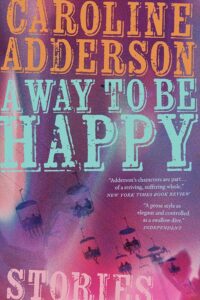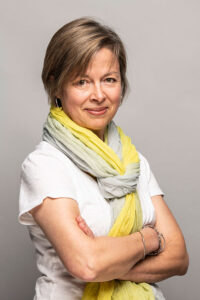With a little help from friends
A Way to be Happy: Stories
by Caroline Adderson
Windsor: Biblioasis, 2024
$22.95 / 9781771966221
Reviewed by Bill Paul
*

In her short story collection, A Way to be Happy, Vancouver’s Caroline Adderson presents us with characters who have suffered their share of life’s inevitable disappointments and disruptions. The author, who has written five novels, two previous books of short stories and twenty kids books, is interested in how people survive worry and uncertainty. The way things go sideways sometimes and stay that way. These are characters who are seeking a resting place or possibly an escape route.
Some of Adderson’s characters gain strength from a family memory—or, it may be an Emily Dickinson poem or a dream about their childhood. Temporary comfort might be provided by a kind word from an employee at the community centre or from a woman at a restaurant professing to be a healing touch therapist. You finish reading these alternately touching and funny stories grateful that the characters have met someone (a partner, a neighbour, a stranger) who they can rely on and that all is not lost. Or is it?
One of the strongest stories is “Started Early, Took My Dog.” Set in the coastal town of Gibsons, the story focuses on a couple, Ani and Freya, their elementary school-aged son, Drew, and the family dog, Jesus. The story unfolds as a series of incidents starting with the sighting of a stranger, a man (“Grubby red ball cap… untucked plaid shirt”) standing behind a fence beside the school that Drew attends.
A second sighting of the man near the couple’s home prompts them to contact the police. Adderson uses precise, descriptive language and terse back and forth dialogue between Ani and Freya to create threads of tension. Often the reader is caught off-guard by the story’s tone of apprehension and unease. Here’s Adderson describing Ani and Jesus out for a walk:
A thought came to her then, standing on the beach watching the dog’s antics. She might lose them all: Drew, Freya. Jesus too. Ani whistled. They walked on to the set of steps that led back up to the street, where she leashed Jesus again. Judging by the sudden surge of traffic, the ferry must have just got in; a car braked for them to cross. On the other side of the street, they turned in the direction of home. She would be alone then—a lone woman—the very state she continually orchestrated for herself, yet the thought made her dry-mouthed with panic now. To distract herself, she kept one eye on the shop windows – housewares store, tourist trap, realty office.
A portrait of male, middle-aged angst is the theme in “The Procedure.” Ken Ketman is a put-upon husband and father who’s been fretting about a routine colonoscopy procedure. Shelby, his wife, isn’t too concerned about her husband’s worries. Over the years she’s turned her attentions to their son, Kenny, and has pretty much lost interest in what goes on in her husband’s life. Even Ketman’s brother and sister-in-law view him as a loser.
Two years before Ketman’s mother inexplicably died on the operating table during regular knee surgery. Add all of this up and Ketman is almost beside himself, worrying constantly about his upcoming medical procedure. Can Ketman survive a suppressed, nagging fear that resembles a “monstrous shape”? The story is a well-constructed set of comic pieces, a black comedy.

For each story, Adderson expertly develops a detailed setting: a Christmas party at a condominium in the False Creek neighbourhood; a resource town in the interior of British Columbia. This is where a random event may occur, an unexpected encounter with a stranger perhaps. Many of these restless characters, despite once being part of a family, have lost that sense of belonging, that sense of at-homeness that was once part of their lives.
Even the character named Varlam, in “Yolki-Palki,” is beset by memories of growing up in a country caught in a civil war. His strongest memory is of planting trees with his grandmother. Now as an adult he’s suffering but unable to understand why. Visiting the Pacific Northwest and living under a false name, he’s stuck in a situation not of his own making. Writing with a clear understanding of Varlam’s confusion and displacement, Adderson delivers a dreamy, surreal ending.
In “All Our Old Acquaintances Are Gone” Adderson introduces Corey and Taryn, a young couple, who live a marginalized existence in Vancouver. Both are drug users who recently lost a close friend, Kayla, to an overdose. Under Corey’s guidance, the two con their way into a Christmas party, make their way into the spare room where the guest’s coats and belongings are stored, and steal whatever they can get their hands on.
Adderson turns her attention to Taryn. She’s a broken person from a broken home. Everything she owns she hauls around in a pair of heavy-duty black plastic bags. At the party she does well impersonating an invited guest and is “less nervous about getting caught now than anxious to getting it done.” Is she disassociating or withdrawing from drugs? Take special note near the end of the story when a guest surprises her in the spare room and asks: “What are you doing?”
For the most part, the author carefully constructs vivid characters from every walk of life. Each one of them making their way to some undetermined fate. That said, some of the stories here feel like experiments and don’t fare so well. Adderson tries her hand at meta-fiction (“Obscure Objects”), historical fiction (“From the Archives of the Hospital for the Insane”), and tears and darts her way through a mother-son story (“Charity”).
In the Giller Prize long-listed collection’s lengthiest story, “Homing,” Marta, a sixtysomething woman recently separated from her husband, relocates to a small town where feral lilacs are in abundance and conversation with the neighbours is scarce. Fending off periods of doubt and regret, Marta eventually experiences a feeling of indescribable joy, a moment that “defied play-by-play.” That’s what Adderson does best: placing her characters in unsettling situations and then introducing them to a variety of possibilities.
[Editor’s note: Caroline Adderson will appear at Word Vancouver (with Shashi Bhat) September 28 at 2:30pm and, in October, Vancouver Writers Festival.]
*
East Vancouverite Bill Paul enjoys photography and reading fiction and nonfiction. [Editor’s note: Bill Paul has reviewed books by William Deverell, Deryn Collier, Jann Everard, Jack Lowe-Carbell, Martin West, Dietrich Kalteis, Suzannah Showler, Curtis LeBlanc, Patrick deWitt, Barbara Fradkin, Dietrich Kalteis, Stan Rogal, Keath Fraser, and John Farrow, and contributed a photo-essay, Trevor Martin’s Vancouver, to BCR.]
*
The British Columbia Review
Interim Editors, 2023-25: Trevor Marc Hughes (non-fiction), Brett Josef Grubisic (fiction and poetry)
Publisher: Richard Mackie
Formerly The Ormsby Review, The British Columbia Review is an online book review and journal service for BC writers and readers. The Advisory Board now consists of Jean Barman, Wade Davis, Robin Fisher, Barry Gough, Hugh Johnston, Kathy Mezei, Patricia Roy, Maria Tippett, and Graeme Wynn. Provincial Government Patron (since September 2018): Creative BC. Honorary Patron: Yosef Wosk. Scholarly Patron: SFU Graduate Liberal Studies. The British Columbia Review was founded in 2016 by Richard Mackie and Alan Twigg.
“Only connect.” – E.M. Forster